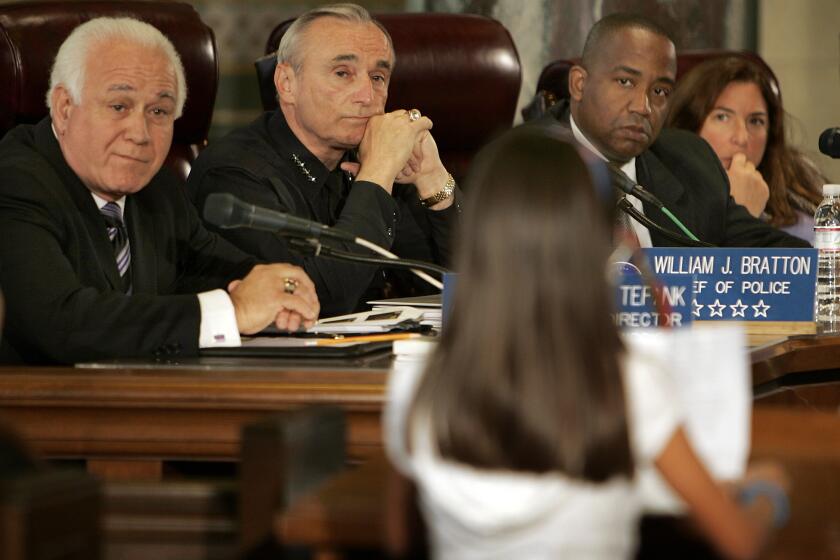Case for, against Prop. 92
To supporters of Proposition 92, the state’s $14.5-billion budget gap proves their point: Voters should approve the measure Feb. 5 to guarantee funding for community colleges.
To opponents of Proposition 92, the shortfall proves that California can’t afford it.
“We’re very concerned about this legislation being voted on when our state is going through such a budget crisis,” said David Sanchez, president of the California Teachers Assn., a union that has urged its members to vote against the statewide initiative. “If something like this were to pass, there would be other programs that would suffer from it.”
But on a recent day, Glendale Community College students gathered for a hillside rally on campus, registering voters and holding signs that read, “Yes! Prop. 92,” as their peers, administrators and professors touted the benefits of passing the measure.
Audre Levy, the school’s superintendent and president, warned that cutting funding to community colleges would not only harm 2.6 million students but the state economy as well.
“Community colleges are the largest providers of workforce,” Levy said, to cheers. “The state needs 3.2 million new workers -- where will they be trained?”
Proposition 92 would decrease fees from $20 to $15 per unit and limit legislators’ ability to increase fees, which would be linked to growth in per capita personal income.
Opponents say the measure would leave less money for discretionary purposes -- particularly in a bad budget year -- including the University of California and Cal State University systems. Those statewide systems are not guaranteed levels of state funding, and their students face fee hikes again this year, 7.4% at UC schools and 10% at Cal State.
The governor’s proposed budget does not call for a fee increase for community college students, who already pay what California officials say are the lowest per-unit fees of any community college system in the nation.
Some students say that decreasing that fee by just $5 would remove some barriers keeping low-income students from getting an education.
“It would be beneficial to these kinds of people to pay $5 less. If there is no reduction in college fees, less people can afford to study,” said Raul Quintero, 27, a psychology student at Los Angeles City College.
Theresa Wheeler, manager of the Californians for the Fair Education Funding campaign against Proposition 92, said fees are only a small portion of the total cost of community college. The campaign says day care, textbooks and transportation often cost more than fees. The group points out that the neediest community college students -- 27% -- already qualify for a waiver and don’t pay fees.
But the majority, such as Anahid Avedian, 19, do pay.
Avedian studies biology at Glendale Community College and works full time as a pharmacy technician. She thinks paying $5 less per unit would help her. “It all adds up,” Avedian said. “I work full time. Money doesn’t come easy. Even a penny counts.”
Proposition 92 also calls for community college funding to be based on a formula determined by young-adult population growth, not on kindergarten through high school enrollment as it is now.
“The current formula pretends everyone we educate comes out of high school. Right now the number coming out of high school is down, so we should get less money?” said Mark Drummond, chancellor of the Los Angeles Community College District.
According to a California legislative analyst’s office report, the state’s young-adult population is forecast to grow 2% to 3% for the next several years, while grade-school attendance is expected to drop.
Such projections hardly sway detractors, who say funding for community colleges shouldn’t be based on an age segment’s population growth.
“The formula is a convoluted process that guarantees their funding whether the students are there or not,” said Karen Zamarripa, assistant vice chancellor for the Cal State system.
Scott Lay, head of the Community Colleges League of California disagrees: “Not a dime is going to phantom students. If our enrollment doesn’t grow at the same rate as the population projections, we’re not going to get that extra money.”
The governing bodies of the UC and Cal State systems have unanimously opposed Proposition 92, citing worries that it would take away from the state’s discretionary funding pool, from which they receive their money.
The analyst’s office estimates that Proposition 92 could cost the state up to $300 million more during each of the first two academic years it’s in effect, before leveling off to current spending levels.
Drummond said that number is “not a budget breaker.”
“If the whole budget goes down, then all bets are off. Everyone shrinks -- us, too,” he said.
“But we’ll shrink proportionately to what we deserve.”
--
daniela.perdomo@ latimes.com
More to Read
Start your day right
Sign up for Essential California for news, features and recommendations from the L.A. Times and beyond in your inbox six days a week.
You may occasionally receive promotional content from the Los Angeles Times.






